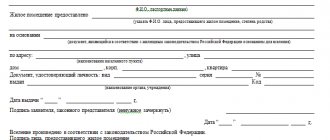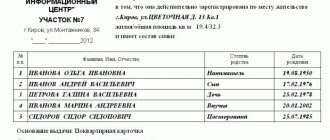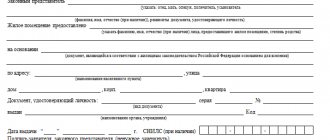Part 1 of Article 47 of the Constitution of the Russian Federation proclaims: “No one can be deprived of the right to have a case considered in the court and by the court to whose jurisdiction it is assigned by law.” This principle is most fully embodied in a comprehensive, objective consideration of the case, when the parties to the process, knowing about their procedural capabilities, make requests, including, to transfer the case to their place of residence. The appeal must be considered by the court.
The petition is officially submitted to the official or court hearing the case to take actions of a procedural nature.
In what cases is it necessary to transfer a case to your place of residence?
The judicial system of the Russian Federation is based on uniform principles, therefore there are no disagreements regarding jurisdiction between courts of general jurisdiction.
The territorial delimitation of courts of the same level is called territorial jurisdiction. Transfer of a case to territorial jurisdiction is a transfer of legal proceedings between judicial districts.
Grounds for transferring a case to the place of residence (MZ):
- the defendant's petition to transfer the case on the breastfeeding;
- petitions of the defendant and plaintiff to transfer the case to the location of the majority of the evidence;
- violation of the rules of territorial jurisdiction during legal proceedings;
- impossibility of further replacement of the court composition after challenge.
Depending on the type of legal proceedings, the grounds for transfer are regulated by Article 29.5 of the Code of Administrative Offenses of the Russian Federation, Article 33 of the Code of Civil Procedure of the Russian Federation, Article 35 of the Code of Criminal Procedure of the Russian Federation.
When a case is sent to another site, it must be accepted for consideration. The judicial system of the Russian Federation is permeated by the unity of the principles of legal proceedings: legality, competition, independence of judges and others. Disagreements among courts of general jurisdiction regarding jurisdiction are not allowed.
Nuances of transferring a case in criminal, civil, administrative proceedings
Criminal proceedings take place where the crime was committed, regardless of the place of registration of the person (Article 32 of the Code of Criminal Procedure of the Russian Federation). A crime that arose in one territory and was completed in another is considered according to the place of completion. Persons who are involved in the case have the right to submit requests to transfer the case on ML to a higher authority (Article 125 of the Code of Criminal Procedure of the Russian Federation).
Cases when territorial jurisdiction can be changed at the request (Article 35 of the Code of Criminal Procedure of the Russian Federation):
- when satisfying a petition to disqualify the court composition;
- if not all participants in the process live in the territory of the trial and all the accused agree to the transfer;
- if there are motivated doubts about the impartiality and objectivity of the court;
- at the request of the Prosecutor General or his deputy, if there is a threat to the safety of the participants in the case or their relatives.
The petition can be submitted before the start of the trial and is considered by a higher court within 10 days (Article 35, Part 3 of the Code of Criminal Procedure of the Russian Federation).
Civil cases, as a general rule, are heard at the location of the defendant; accordingly, requests to change territorial jurisdiction come mainly from defendants (Article 28 of the Code of Civil Procedure).
However, the plaintiff can also submit requests that entail a change in jurisdiction (Article 29 of the Code of Civil Procedure of the Russian Federation). In this case, the plaintiff himself decides where geographically it is more convenient for him to take part in the legal proceedings. The jurisdiction chosen by the plaintiff is called alternative.
The range of cases when the plaintiff can file a motion to transfer the case:
- on the protection of consumer rights;
- the defendant’s place of residence is unknown or he lives outside the Russian Federation;
- about divorce (if there are minor children or health problems);
- on the restoration of labor rights;
- on the restoration of pension and housing rights;
- on compensation for harm to health;
- about establishing paternity;
- if the location of the defendant is unknown;
- if the contract specifies the place of their execution.
When filing a petition under the Code of Civil Procedure, you must indicate the reasons why the case should be transferred to another territorial jurisdiction. For the defendant it is enough to indicate his place of residence, for the plaintiff the motive will be Art. 29 Code of Civil Procedure of the Russian Federation.
As part of administrative proceedings, petitions are regulated by Article 24.4 of the Code of Administrative Offenses of the Russian Federation, which states that the petition must be considered without delay and immediately. Immediacy means the period of proceedings.
When filing a petition during the preparation of the Protocol on an administrative offense, it can be attached to the Protocol on a separate sheet indicating this in the Protocol. Otherwise, the request may not reach the court, or it may be stated as an addition to the Protocol itself.
Agrarian and industrial complex of the Russian Federation and transfer of cases
In arbitration proceedings, the plaintiff can choose which court to appeal to ( Article 36 of the Arbitration Procedure Code of the Russian Federation ). However, the general rules state that the claim must be filed at the place of residence of the other party. Moreover, if the participants were able to agree on where to send the claim, they have the right to determine the territory for the consideration of the case independently, until the court accepted the application for consideration.
Thus, the plaintiff can only bring a claim in the court that has jurisdiction over the defendant's last known location. The defendant, after receiving information about the upcoming dispute, has the right to demand that the place of consideration of the case be moved if he has changed his place of residence. In this case, according to the APC, the petition will be granted.
According to Art. 39 of the Arbitration Procedure Code of the Russian Federation, a number of claims fall under exclusive jurisdiction, which presupposes the existence of specific rules for the consideration of arbitration cases.
There are ten such points in the article. Among them, for example, is the requirement to file a counterclaim in the same court that considered the initial appeal. At the same time, other principles of territorial jurisdiction are ignored.
Having applied to the arbitration court with a request to transfer the consideration of the case to another judicial body, the parties receive a decision in which the claim is satisfied or rejected. The decision can be appealed in accordance with the established procedure; a period of ten days is allotted for this.
How to write a petition correctly?
The petition is submitted in free written form, the result of the consideration will be a court decision on approval or refusal. The chances of satisfying the request depend on the weight of the justification for the court, on confirmation of the address of the place of stay (residence), as well as on the correctly drawn up document.
Structure of the application:
- address part. At the top right is the address, name of the judicial authority, full name of the judge, full name of the applicant, address and telephone number.
- title “Petition to transfer the case to the place of residence”, case number. Located in the middle.
- descriptive part. Here you should state the essence, motivate the reasons for the request, not forgetting to mention the right to an objective, comprehensive consideration of the case and the right to file petitions.
- pleading part (Due to the above circumstances, taking into account the address of residence, I ask you to transfer..).
- date, signatures that should be placed immediately after the text of the main part in order to avoid “additions”.
The petition is drawn up in any written form.
A sample application can be downloaded here:
What else is required to satisfy the request:
- copies of identification documents;
- a copy of the passport page with the registration stamp;
- rental agreement, social tenancy, or other document confirming permanent residence;
- certificate of registration at the place of residence;
- copies of the petition and attached documents according to the number of persons in the case.
It is important to document your residence in another jurisdiction, which gives you the right to file a petition.
Grounds for postponing a court hearing
Valid reasons for postponing a court hearing:
- Business trip. Confirmed by a travel certificate.
- Disease. Certificate from a medical institution or sick leave.
- Employment of a lawyer in another process. It is confirmed by the summons, in addition, by information from the official website of the court.
- Other noteworthy reasons.
The list of valid reasons is not exhaustive, since our whole life is multifaceted, anything can happen: an accident before the trial, an accident in the housing and communal services sector, another case that prevents your appearance in court.
Attention : watch the video on protecting rights in administrative cases, and also subscribe to our YouTube to learn the advice of a lawyer and receive free advice from a lawyer in Yekaterinburg through comments on the video.
Conditions for submitting an application
Any procedural action requires compliance with the requirements established by the legislator.
Who can apply?
Both the plaintiff and the defendant can file motions. The defendant has more rights in this matter; this is the traditional position of jurisprudence, known since Roman law: “the plaintiff follows the defendant.”
At the pre-trial stage, a person accused of committing an offense can file petitions.
Where to submit the application?
The request is submitted to the court in whose proceedings the case will be heard. If we are talking about a process within the framework of the Criminal Procedure Code, the appeal is sent to a higher court.
When to submit an application?
Regardless of the type of court hearing, the petition is submitted before the start of the parties' debates.
Any petition, including the transfer of the case on ML, is submitted before the start of the parties' debates at the court session.
Within the framework of the Arbitration Procedure Code of the Russian Federation, a request can be submitted from the moment when the official, accusing the commission of an offense, drew up a Protocol on the Administrative Offence.
In criminal proceedings, the type of petition discussed in the article is submitted before the start of the court hearing.
Civil proceedings provide for the possibility of filing a petition at a preliminary or first hearing.
How to submit an application?
The legislator provides for filing a petition both orally and in writing (Article 35 of the Code of Civil Procedure of the Russian Federation, Article 61 of the Code of Criminal Procedure of the Russian Federation, paragraph 3 of Article 205 of the Code of Criminal Procedure of the Russian Federation, Article 120 of the Code of Criminal Procedure of the Russian Federation). In case of refusal, the oral form will be difficult to appeal with a productive result.
The document can be submitted to the court office or through the person who drew up the Protocol on the Administrative Offence. To avoid misunderstandings in the form of a “lost” request, it is advisable to send the request by registered letter or certified telegram, keeping the correspondence stubs.
It is possible to submit via email, but the reality is that the request may be lost. In addition to the application, you need to make sure that it is included in the case materials, received by the court and satisfied. Otherwise, the trial may take place in absentia.
Payment of state There is no fee required when filing an application.
How to inform the court about the impossibility of appearing?
- Telephone method from ligature , just call and your call should be recorded as a telephone message. The call should be addressed to the judge who is considering your case. If you do not know the judge’s phone number, you can find it on the court’s website or by finding out this information in the court office.
- Fax – sending your request to the court by fax. To do this, it is necessary that the court office receive a fax from you and transmit the appeal to the judge. Be sure to check with the court office staff about the readability of what you received; if the fax did not go through, try again.
- Mail. You can send a written request to postpone the case describing the reasons for not appearing by regular letter, but we recommend that our clients use registered mail in correspondence with the court, or even better, a letter with an inventory containing an accurate description of the contents of the envelope.
- Express delivery . More effective than mail - a written and reasoned petition is sent to the court. We cite the speed of delivery as an advantage in terms of efficiency, since sometimes every day is important, and Russian Post has regulated deadlines for delivering correspondence, which will not always satisfy your needs.
- Internet networks. Sending an email to the court's email address indicating the name of the judge, the date and time of the hearing and the reason for non-appearance. This method of notification has become new for persons applying for judicial protection, but no less prompt.
- Contact us for legal assistance above. Drawing up and sending a reasoned written petition to the court through a representative (lawyer) removes the worry, since a professional is involved in the case, knowing exactly the content of the future petition to postpone the process and the method of its delivery. Moreover, by submitting a petition, you have the opportunity to enter into an agreement on the provision of legal assistance with our organization for the further conduct of the case in court.









